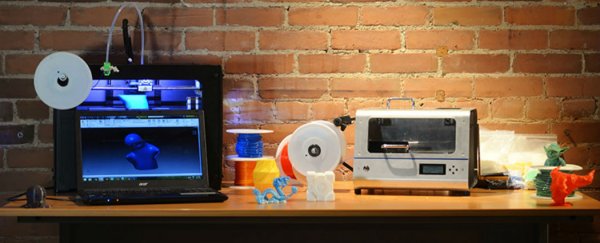Watching how relatively quickly 3D printing has hit the mainstream over the past few years has been fascinating. They're turning up in university labs and school rooms, you can buy one to stick in your living room for $100. It's become so easy for people to 3D-print guns in the privacy of their homes that the US state of Massachusetts has recently banned their manufacture, saying that as an American, you have a right to bear arms, but you do not have a right to bear "electrical arms", which is anything that comes out of a 3D-printer.
Whether a fad or an integral part of our future, 3D printers are sure making an impact, but not always in the way we want. When you print something, you're going to end up with little plastic corners and ends that are trimmed off and discarded because they're too small to reuse. Think about how many 3D printers there are in the world and how many things they're printing every day, and that's a whole lot of waste that can only really end up in landfill.
So three engineering physics students at the University of British Columbia in Canada have invented the ProtoCycler, a device that can grind up all kinds of waste plastic into a beautiful clean spool of plastic filament that can be used in a 3D printer. We're talking anything - plastic bottles, 3D-printing cut-offs, takeaway food containers. If your kids leave their LEGOs out one too many times for you to tread on with your bare feet… throw them in too. It works just like a juicer, which you can see in the video below.
"We were concerned about the amount of plastic waste generated in our engineering projects, so we looked for a way to recycle that plastic back into usable filament," one of the team, Dennon Oosterman, said in a press release.
Not only is this great for the environment, but the team says it will save you a fortune in filament costs for your 3D printing. They say a kilogram spool of filament produced by the ProtoCycler will cost you nothing if you BYO waste plastic, and if you buy their special plastic pellets, it's just $5. The cheapest store-bought spool starts at $30. Plus their device offers a much wider range of colour options than the ready-made spools you buy.
The device isn't cheap at $699, but it's basically like buying a device that cheaply produces ink to use in your regular printer. …Someone please invent that immediately…
The team hopes that the ProtoCycler will be something schools invest in so their students can go absolutely nuts on their 3D printers without the environment or their school's budget having a total heart attack. "Schools are including 3D printing as part of their science and technology curriculum, but the cost of having each student try a project can quickly become unaffordable," Oosterman says. "With ProtoCycler, the students can try over and over until it's perfect, nearly for free, without harming the environment."
That last part in particular sounds so good.
